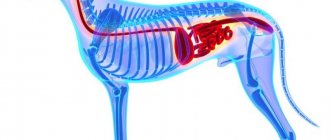What are Essential Fatty Acids (EFAs)?
This is a series of polyunsaturated fatty acids that the body cannot synthesize on its own. These include 2 families - Omega-3 and Omega-6 fatty acids.
Omega-3 acids include eleven polyunsaturated fatty acids, the main of which are: alpha-linolenic acid, eicosapentaenoic acid (EPA), docosahexaenoic acid (DHA).
Omega-6 acids generally include eleven polyunsaturated fatty acids, the main of which are linoleic and arachidonic acid.
Can a dog have too many omega-3 fatty acids?
A balanced diet is not too much and not too little. Although omega-3 fatty acids are essential for a dog's well-being, we should not overdo it. Some people add fish oil and other oils to every food their dog has. Excess of said oil will not be particularly toxic, so side effects are considered mild.
The problem is that while many of the omega-3 rich foods contain healthy fats, they are still fatty. Adding too much to your dog's diet can cause your dog to become overweight. They can also cause certain gastrointestinal problems, which can lead to vomiting, diarrhea and other symptoms .
What products do they contain?
Omega-6
Linoleic acid is found in most vegetable oils. It makes up more than 70% of the fatty acids in evening primrose oil and more than 50% in sunflower, wheat, corn and soybean oils. Arachidonic acid is found naturally in foods of animal origin. Vegetable oils contain virtually no arachidonic acid. Is indispensable for cats.
Omega-3
Alpha-linolenic acid is found in green vegetables, fruits, grass, and is found in concentrated form in soybean and flaxseed oils. Cold-water fish oil contains high levels of two long-chain fatty acids derived from linolenic acid: eicosapentaenoic acid (EPA) and docosahexaenoic acid (DHA).
Side effects
Polyunsaturated fats are used to treat and prevent many diseases. But sometimes omega 3 and 6 can cause harm. In most cases, this is due to exceeding the dosage. Other causes of side effects include:
- allergy;
- improper storage of vitamins;
- low product quality;
- use of fish liver fats.
Side effects such as nausea, vomiting, diarrhea indicate individual intolerance to the components. Other side effects include:
- obesity, because fish oil is very high in calories;
- Immunity disorder associated with excess dosage.
Remember that under the influence of light, heat, and oxygen, beneficial fatty acids are oxidized and converted into free radicals that can damage DNA. Taking fish oil and vitamin E together helps avoid oxidation.
If the pet does not have allergies, and the fish oil is made from high-quality raw materials and was stored correctly, breeders should not forget about the harmful effects of excessive consumption of vitamins. Fish oil is indicated for dogs whose diet is based on natural food. If your dog eats canned food or dry food, study its composition. Perhaps all the vitamins, minerals, and microelements he needs are already present in his food. In this case, additional omega-3 can be given only on the recommendation of a veterinarian.
Sometimes a lack of nutrients is better than an excess of them. Unlike water-soluble vitamins, fat-soluble omega-3 and 6 accumulate in muscles, tissues, and organs. An overdose of vitamin A in this case will lead to the following adverse reactions:
- dizziness;
- problems with skin, coat;
- reproductive dysfunction;
- lack of appetite.
Excess vitamin D causes:
- excessive urination;
- damage to the walls of blood vessels;
- blood thinning, bleeding;
- leaching of calcium from bones, its accumulation in soft tissues;
- diabetes.
An excess of fish oil leads to heavy metal poisoning, because it is unprofitable to grow raw materials on special farms, and fish are harvested in the world's oceans, which are becoming more and more polluted every year.
What are the symptoms of deficiency? How to identify acid deficiency?
Skin symptoms include dry skin, dull coat, keratoses (keratinization) and seborrhea (flaking). To determine Omega-3 deficiency in people, a method has been developed - determining the Omega-3 index - this is the total percentage of EPA and DHA from the total amount of fatty acids in the erythrocyte membrane. In Russia, such methods do not exist for animals.
How to provide your pet with essential fatty acids in the right quantities?
- with food in the form of ready-made food (most often, these are diets to improve the condition of the skin and coat) and in the form of dietary supplements (borage oil, evening primrose, salmon), which can be added to the main diet. They have a beneficial effect on the entire body, not just the skin;
- in the form of spot-ons, which are applied to the pet’s skin as a flea remedy. In this case, the action will be local.
No matter how acids enter the body, it takes a lot of time for the effect of their use to become noticeable - at least 2-4 months.
Should I give my dog fish oil?
Veterinarians recommend using this supplement from puppyhood. The fact is that, unlike humans, the dog’s body is not capable of synthesizing vitamins A and D. It can only receive both elements from the outside.
It is equally important that fatty fish and rich broths based on them are contraindicated for four-legged pets. For this reason, they cannot replenish the missing substances with regular foods and need to take special supplements. What exactly is fish oil good for dogs can be found out below.
Benefit
Most often, the drug is prescribed for the purpose of prevention. Thanks to regular intake in the animal:
- strengthens the immune system, bones and muscles;
- skin condition and coat quality improves;
- metabolism is normalized;
- the aging process slows down;
- vision becomes sharper, including night vision;
- cholesterol levels decrease.
The dietary supplement also helps in the fight against dermatitis and prevents cardiovascular diseases and cancer. The positive effect on bone structure is especially important for growing puppies and pets with diseases of the musculoskeletal system.
Possible harm
The use of the drug is permissible only as prescribed by a veterinarian. Otherwise, due to exceeding the dosage, the effect of taking it will be the opposite. Oversaturation of the body with its constituent elements is fraught with:
- dizziness, poor appetite and disorders of the reproductive system;
- hair loss and dry skin;
- the appearance of gastritis, hepatitis and diabetes;
- narrowing of blood vessels and bleeding disorders, increasing the likelihood of bleeding;
- intense urine production;
- the development of osteoporosis due to abundant calcium deposition in soft tissues.
Similar problems can be caused by violation of storage terms and conditions. Also, don't skimp on quality. The suspiciously low cost, which does not correspond to the market average, can be explained by the use of cheap raw materials. The use of such a product is fraught with heavy metal poisoning.
Are they useful in treating skin diseases?
The anti-inflammatory effect of these substances has long been adopted by both humane and veterinary dermatologists. Essential fatty acids have not proven to be very effective in the monotherapy of dermatological diseases, but they are quite useful as adjuncts. Their use makes it possible to reduce the dose of anti-itch medications, which reduces the drug load on the body and saves money.
An excellent dietary supplement for replenishing essential fatty acids is VIVIDUS salmon oil . It has one of the highest levels of OMEGA-3 content (32%). Does not contain additives or preservatives. The oil goes from fresh raw materials to the finished product in just two hours, preserving all the beneficial properties of fish oil. Beneficial properties: plastic nervous system, excellent vision, healthy heart, blood vessels and joints, beautiful skin and coat, strong immunity.
At the First Veterinary Pharmacy you can find other additives and dietary supplements containing essential fatty acids: Brewer's yeast 8in1 Excel, Wolmar Winsome pro bio omega 2500, Omega Neo treat, fish oil and GiGi Omega 3 . Our consultants will help you choose a supplement or dietary supplement and tell you about its use and contraindications.
Materials for the article were provided by veterinarian, allergist, and dermatologist Olga Vladimirovna Chechora.
Health and beauty to you and your pets!
Benefits of Omega-3 Fatty Acids for Dogs
Omega-3 fatty acids are essential oils that are only available to dogs through the diet. This is because omega-3 oils are metabolized as nutrients by the body since it cannot synthesize them on its own. They are known as essential fatty acids due to dogs' inability to make them themselves. Here are the general health benefits omega-3 fatty acids provide for dogs:
- Boosts your immune system
- Strengthens joints and reduces the chances of arthritis.
- Reduce joint pain if you already have arthritis or other joint conditions.
- Helps keep the heart healthy.
- Helps liver and kidney function
- Improves the quality of skin and coat.
- This may help prevent certain types of cancer.
A deficiency of omega-3 fatty acids can cause a variety of health problems in dogs. Some of the most noticeable ones are those that affect the condition of your dog's skin, coat, and nails. Less obvious but equally serious problems include joint weakness. Omega-3 fatty acids are not only essential for canine well-being . They can also provide certain health benefits to improve your fitness and appearance.
These fatty oils act similar to antioxidants in the body. Although their exact effects have not yet been determined, reports indicate that they have a mild anticoagulant effect[one]. This means they may be useful in preventing cardiovascular disease. Since they have the potential to positively impact a dog's cardiovascular system , this makes them especially important for young puppies and older dogs.
Since omega-3 fatty acids help keep a dog's coat and nails healthy, they are useful in protecting them from the elements. Since a dog's hair and coat are indicators of his overall well-being, they should be included in his diet.
There are certain breeds that are believed to have even greater benefits from omega-3 fatty acids. This is because dog breeds such as the Shar Pei, French Bulldog or Pug have folds in their skin that make them susceptible to diseases such as atopic dermatitis. Essential fatty oils can help keep your skin healthy and avoid such health problems. This is why omega-3 fatty acids should be included in your diet.











